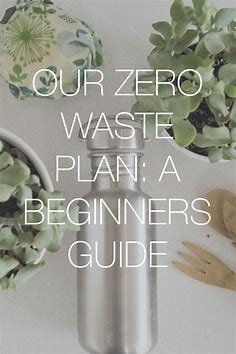Zero-waste living is a lifestyle that aims to minimize waste, particularly single-use plastics, and encourage sustainable practices that benefit both the environment and your well-being. The goal is to divert waste from landfills, reduce pollution, and reduce reliance on disposable goods. Transitioning to zero waste can seem overwhelming at first, but by making small, consistent changes, you can significantly reduce your environmental impact.

1. Start with the 5 R’s
The zero-waste lifestyle is based on five principles, known as the 5 R’s:
- Refuse: Say no to items or packaging you don’t need or that are unnecessary.
- Reduce: Cut down on the amount of stuff you buy or use, focusing on quality and long-lasting items.
- Reuse: Opt for items that can be reused rather than disposed of after a single use (e.g., reusable bags, bottles, containers).
- Recycle: Recycle responsibly and ensure you follow your local recycling guidelines.
- Rot: Compost organic waste like food scraps and yard waste, rather than sending it to a landfill.
2. Refuse Single-Use Plastics
- Bring your own bags: Always carry a reusable bag when shopping, and try to avoid stores that give out plastic bags. Bring reusable produce bags for fruits and vegetables as well.
- Say no to plastic straws: If you need a straw, opt for reusable options made from stainless steel, bamboo, or silicone.
- Avoid unnecessary packaging: Be mindful of over-packaged products and try to choose items with minimal or recyclable packaging.
- Refuse plastic cutlery: If you’re ordering takeout, ask for no plastic utensils, or bring your own reusable cutlery.
3. Reduce Waste
- Buy in bulk: Purchasing products in bulk reduces the need for individual packaging. Many stores now offer bulk bins for grains, spices, nuts, and more. Bring your own containers to fill.
- Buy less, choose wisely: Consider the longevity of products before buying. Opt for items that are durable, high-quality, and multi-functional.
- Opt for quality over quantity: Invest in high-quality items that will last longer, such as sturdy kitchen tools, clothing, and electronics, instead of constantly replacing cheap, disposable alternatives.
4. Reuse and Repurpose
- Use reusable containers: Store food in reusable glass or stainless steel containers, instead of using plastic wrap or plastic bags. Reusable jars can also be used to store leftovers or organize small items.
- Repurpose items: Before tossing something out, consider how it might be repurposed. Old jars can become storage containers, t-shirts can be turned into rags, and worn-out towels can be cut into cleaning cloths.
- Use cloth instead of paper: Swap paper towels for reusable cloth napkins or towels. Use a washable cloth instead of disposable wipes for cleaning.
5. Compost Organic Waste
- Start a compost bin: Composting food scraps like fruit and vegetable peels, coffee grounds, eggshells, and yard waste can reduce the amount of organic waste sent to landfills. You can set up a composting system in your yard, or some cities offer composting services.
- Compost in small spaces: If you live in an apartment, consider using a countertop compost bin or a worm bin to compost small amounts of food waste.
6. Shop Smart and Sustainable
- Choose eco-friendly products: Look for products made from natural materials (e.g., cotton, bamboo, glass, and metal) instead of plastics. Check for certifications like Fair Trade, B Corp, or organic labels, which promote ethical and sustainable production.
- Buy secondhand: Whenever possible, buy secondhand items from thrift stores, garage sales, or online marketplaces. This helps reduce the demand for new products and extends the life of items that already exist.
- Support sustainable brands: Choose brands that prioritize sustainability by using eco-friendly materials, minimizing waste in production, and offering products with long lifespans.
7. Make Your Own Household Cleaners
- Natural cleaning products: Many commercial cleaners come in plastic bottles and contain harmful chemicals. You can make your own cleaners using simple, natural ingredients like vinegar, baking soda, and lemon juice.
- DIY laundry detergent: Instead of buying plastic-packaged laundry detergents, try making your own laundry powder or liquid detergent, or opt for brands with biodegradable packaging.
8. Opt for Digital Over Paper
- Go paperless: Switch to electronic bills, banking, and newsletters to reduce the amount of paper waste in your life. Use digital calendars, reminders, and notes instead of paper planners and sticky notes.
- Use cloth napkins: Instead of paper napkins or paper towels, use reusable cloth napkins. These can be washed and used again, which saves trees and reduces waste.
9. Reduce Energy and Water Consumption
- Use energy-efficient appliances: Choose appliances that are energy-efficient to reduce energy consumption, like LED light bulbs, energy-efficient refrigerators, and low-flow showerheads.
- Fix leaks: A leaking faucet or pipe can waste both water and energy. Fix any leaks in your home to save both resources.
- Be mindful of water use: Take shorter showers, turn off the tap when brushing your teeth, and only run dishwashers or washing machines with full loads to minimize water waste.
10. Educate Yourself and Others
- Stay informed: Keep learning about zero-waste principles and solutions that work for you. There are plenty of resources like books, documentaries, and blogs to inspire and inform your journey.
- Encourage others: Share your experiences with family, friends, and coworkers, and inspire them to make small changes in their own lives. The more people embrace zero waste, the bigger the impact we can collectively make.
11. Celebrate Progress, Not Perfection
- Take it step-by-step: Transitioning to a zero-waste lifestyle doesn’t need to happen overnight. Focus on making one change at a time and celebrate your progress, no matter how small.
- Be kind to yourself: Going zero waste is about reducing waste over time, not achieving perfection. If you forget your reusable bag or purchase an item with plastic packaging, don’t feel guilty—just make a more mindful decision next time.
Conclusion
Living a zero-waste lifestyle is an ongoing journey that involves making intentional, mindful choices to reduce your environmental footprint. Start with small, manageable steps and gradually adopt more sustainable habits. As you reduce your waste, you’ll not only be helping the planet, but you’ll also experience the benefits of a simpler, less cluttered life. Remember, every effort counts, and even small changes can make a big difference in the long run.
